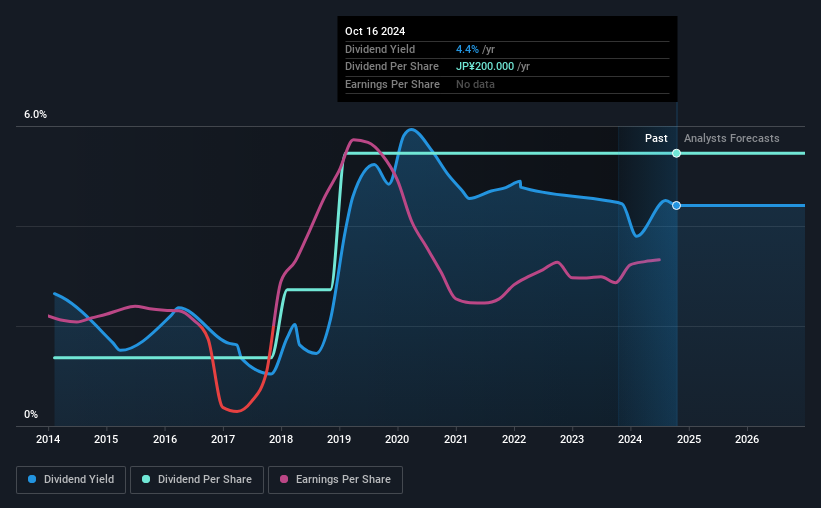The board of Nippon Carbon Co., Ltd. (TSE:5302) has announced that it will pay a dividend of ¥100.00 per share on the 29th of March. The dividend yield will be 4.4% based on this payment which is still above the industry average.
See our latest analysis for Nippon Carbon
Nippon Carbon's Projected Earnings Seem Likely To Cover Future Distributions
A big dividend yield for a few years doesn't mean much if it can't be sustained. The last dividend was quite easily covered by Nippon Carbon's earnings. This indicates that a lot of the earnings are being reinvested into the business, with the aim of fueling growth.
Over the next year, EPS is forecast to expand by 11.4%. Assuming the dividend continues along recent trends, we think the payout ratio could be 53% by next year, which is in a pretty sustainable range.

Nippon Carbon Has A Solid Track Record
Even over a long history of paying dividends, the company's distributions have been remarkably stable. Since 2014, the dividend has gone from ¥50.00 total annually to ¥200.00. This implies that the company grew its distributions at a yearly rate of about 15% over that duration. We can see that payments have shown some very nice upward momentum without faltering, which provides some reassurance that future payments will also be reliable.
Dividend Growth Potential Is Shaky
Investors could be attracted to the stock based on the quality of its payment history. Let's not jump to conclusions as things might not be as good as they appear on the surface. Nippon Carbon's EPS has fallen by approximately 18% per year during the past five years. This steep decline can indicate that the business is going through a tough time, which could constrain its ability to pay a larger dividend each year in the future. On the bright side, earnings are predicted to gain some ground over the next year, but until this turns into a pattern we wouldn't be feeling too comfortable.
In Summary
Overall, a consistent dividend is a good thing, and we think that Nippon Carbon has the ability to continue this into the future. With shrinking earnings, the company may see some issues maintaining the dividend even though they look pretty sustainable for now. This looks like it could be a good dividend stock going forward, but we would note that the payout ratio has been at higher levels in the past so it could happen again.
Companies possessing a stable dividend policy will likely enjoy greater investor interest than those suffering from a more inconsistent approach. Meanwhile, despite the importance of dividend payments, they are not the only factors our readers should know when assessing a company. Are management backing themselves to deliver performance? Check their shareholdings in Nippon Carbon in our latest insider ownership analysis. If you are a dividend investor, you might also want to look at our curated list of high yield dividend stocks.
Valuation is complex, but we're here to simplify it.
Discover if Nippon Carbon might be undervalued or overvalued with our detailed analysis, featuring fair value estimates, potential risks, dividends, insider trades, and its financial condition.
Access Free AnalysisHave feedback on this article? Concerned about the content? Get in touch with us directly. Alternatively, email editorial-team (at) simplywallst.com.
This article by Simply Wall St is general in nature. We provide commentary based on historical data and analyst forecasts only using an unbiased methodology and our articles are not intended to be financial advice. It does not constitute a recommendation to buy or sell any stock, and does not take account of your objectives, or your financial situation. We aim to bring you long-term focused analysis driven by fundamental data. Note that our analysis may not factor in the latest price-sensitive company announcements or qualitative material. Simply Wall St has no position in any stocks mentioned.
About TSE:5302
Nippon Carbon
Engages in the manufacture and sale of carbon products in Japan.
Flawless balance sheet established dividend payer.
Similar Companies
Market Insights
Community Narratives




